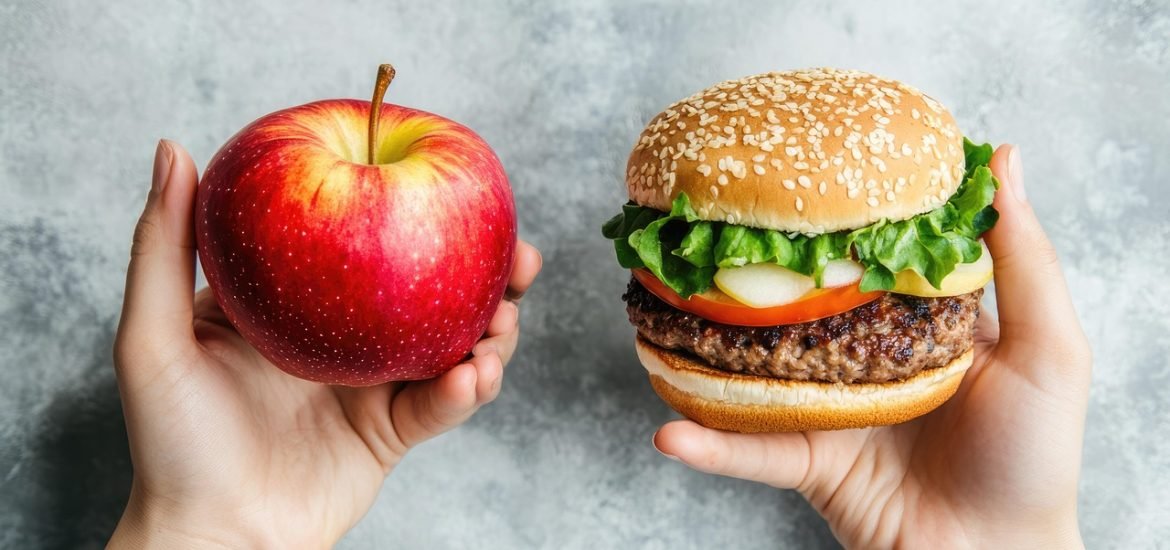
It’s easier to lose weight by avoiding processed foods, according to a study published in Nature Medicine. Participants ate nutritionally identical diets, but those eating minimally processed foods managed to lose almost twice as much as those eating ultra-processed foods. The authors suggest that reducing the amount of processed foods can help sustain a healthy long-term weight.
This study, by a team from UCL and UCLH, is the first to compare ultra-processed and minimally processed food diets in real-world conditions. The team recruited 55 participants, who were divided into two groups. One group followed a diet with minimally processed foods for 8 weeks and then swapped to a diet rich in processed foods. The other group ate the identical diets but in the opposite order.
Both diets were identical regarding nutrients according to the Eatwell Guide, the UK’s official government advice on how to eat a healthy, balanced diet. This included levels of fat, saturated fat, protein, carbohydrate, salt, and fibre, as well as the recommended intakes of fruits and vegetables. Participants were told to eat as much or as little as they wanted, as they would normally. There was no limit on their intake.
After 8 weeks on each diet, both groups lost weight, likely because of the improved diets compared to what they would typically eat. However, this effect was higher when participants ate the minimally processed diet than when they were on the high-processed foods. These results show that choosing minimally processed foods may be more effective for losing weight.
“Previous research has linked ultra-processed foods with poor health outcomes. But not all ultra-processed foods are inherently unhealthy based on their nutritional profile. The main aim of this trial was to fill crucial gaps in our knowledge about the role of food processing in the context of existing dietary guidance, and how it affects health outcomes such as weight, blood pressure and body composition, as well as experiential factors like food cravings,” said Dr Samuel Dicken, first author of the study from the UCL Centre for Obesity Research and UCL Department of Behavioural Science & Health.
“The primary outcome of the trial was to assess percentage changes in weight, and on both diets, we saw a significant reduction, but the effect was nearly double on the minimally processed diet. Though a 2% reduction may not seem very big, that is only over eight weeks, without people trying to actively reduce their intake. If we scaled these results up over the course of a year, we’d expect to see a 13% weight reduction in men and a 9% reduction in women on the minimally processed diet, but only a 4% weight reduction in men and 5% in women after the ultra-processed diet. Over time, this would start to become a big difference.”
Participants also completed a questionnaire to measure their food cravings before starting the diets and during the study. Eating minimally processed foods reduced the number of cravings, and participants were better able to resist them (craving control) than when they were eating processed foods.
“The global food system at the moment drives diet-related poor health and obesity, particularly because of the wide availability of cheap, unhealthy food. This study highlights the importance of ultra-processing in driving health outcomes in addition to the role of nutrients like fat, salt, and sugar. It underlines the need to shift the policy focus away from individual responsibility and onto the environmental drivers of obesity, such as the influence of multinational food companies in shaping unhealthy food environments,” said Professor Chris van Tulleken, an author of the study from UCL Division of Infection & Immunity and UCLH.
“Stakeholders across disciplines and organisations must work together and focus on wider policy actions that improve our food environment, such as warning labels, marketing restrictions, progressive taxation and subsidies, to ensure that healthy diets are affordable, available and desirable for all.”
“Despite being widely promoted, less than 1% of the UK population follows all of the recommendations in the Eatwell Guide, and most people stick to fewer than half. The normal diets of the trial participants tended to be outside national nutritional guidelines and included an above average proportion of UPF, which may help to explain why switching to a trial diet consisting entirely of UPF, but that was nutritionally balanced, resulted in neutral or slightly favourable changes to some secondary health markers,” added Professor Rachel Batterham, senior author of the study from the UCL Centre for Obesity Research.
“The best advice to people would be to stick as closely to nutritional guidelines as they can by moderating overall energy intake, limiting intake of salt, sugar, and saturated fat, and prioritising high-fibre foods such as fruits, vegetables, pulses, and nuts. Choosing less processed options such as whole foods and cooking from scratch, rather than ultra-processed, packaged foods or ready meals, is likely to offer additional benefits in terms of body weight, body composition, and overall health.”
Dicken, S.J., Jassil, F.C., Brown, A. et al. Ultraprocessed or minimally processed diets following healthy dietary guidelines on weight and cardiometabolic health: a randomized, crossover trial. Nat Med (2025). https://doi.org/10.1038/s41591-025-03842-0